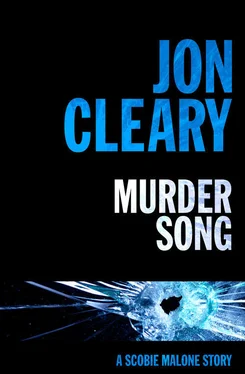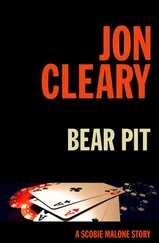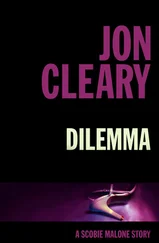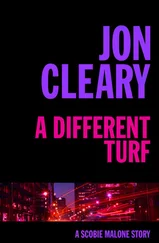He went through the drawers of the closet and the dressing-table. In the bottom drawer of the latter he found what a policeman always hopes for: the personal give-away that we always leave when we depart this life unexpectedly, the secret at last exposed to the light.
It was a journal rather than a diary; there were no dates other than the year, 1989, in gold figures on the green cover. There were no names, only initials; it seemed, however, that Mardi Jack wrote only about the men in her life, it was an all-male world except for herself. It seemed, too, that she fell in love, genuine love, as other people, fumble-footed, fall into holes that more nimble-footed elements avoid. The men, it also seemed, walked away, leaving her floundering; she would be bitter for a time, then the next temptation would appear. Christ, thought Malone, what makes women such masochists? He had forgotten that Lisa had already given him the answer: love is both a form of possession and a form of masochism and women feel the latter more deeply than men. Men once wore hair shirts, but it was women who had woven them and tried them on first.
The later entries spoke of B., ‘ the love of my life’ . He appeared sincere and gentle enough in the early days of their relationship – ‘ He makes me feel as if I’m walking on clouds. All I want to do is sing love songs, happy ones. Get lost, Billie Holliday .’ Then the words and music started to change: ‘ God, he is just like the rest of them. The second brushoff in a week .’ One could feel the anger in her pen; the writing was shaky. ‘ No excuses. I just won’t be there tonight, he says. Jesus, why do I bother? Won’t I ever learn? Come back Billie Holliday, Edith Piaf, all you women who cry the blues! I know, boy do I know, what you mean !’
Malone was embarrassed by the melodrama of her feelings, the banality of the entries; but she hadn’t been writing for him or anyone else, not even the man who had dumped her. He should not expect the laconic reporting style of a police running sheet.
The last entry must have been written on Saturday just before she had gone out to her death; the writing seemed to quiver on the page: ‘ I’m seeing B. tonight – I hope! We must have it out between us. Will this be our last meeting? Please God no! He says there is someone else … When I first met him all those years ago in London there was already someone else – ah, but he was a different man then and I wasn’t even a woman, just a different girl .’
Malone closed the journal, continued his search, found nothing else that was helpful. He took the journal downstairs with him. ‘I’ll be taking this with me. I’ll sign for it. Did you ever see her writing in this?’
Gina Cazelli shook her head; she sat at the kitchen table sipping a second cup of cappuccino or perhaps even a third. There was still the look of pain on her round face, almost like a bruise. ‘You find anything in it?’
‘Just a reference to someone called B. She never mentioned him?’
‘Never. But he was probably the guy she’s been seeing lately.’ She frowned, squeezing her memory. ‘I can’t remember any of the guys she brought home, none of their names started with a B. There was a Charlie and a Roger and a Raul – he was South American. They were all bums, fly-by-nights or in the morning, but she couldn’t see that and I never told her.’
‘Well, it’s too late to tell her now. I’ll send a police-woman out here to go through her things again. If you think of anything that might help, ring me.’ He dropped his card on the table. Then he said, as he might to Claire in five or six years’ time, ‘Be careful with your men, Gina.’
She smiled wearily, wryly. ‘What men?’
He left her then, went out to the Commodore; sure enough, there was another parking ticket stuck behind one of the wipers. There were also two splashes of bird-crap on the bonnet. Grey Bombers and their tickets were not universal; but birds were everywhere, always haunting him. If he took the Commodore to Antarctica, the penguins would be sure to leave their frozen mark on it.
3
Russ Clements was already back at Homicide waiting for him, cleaning out his murder box, a cardboard shoe box, of last week’s homicide and making room for this week’s bits and pieces that might add up to incriminating evidence. So far there was very little.
‘We went right through the apartment building, but came up with nothing. There’s only six permanent residents – the rest of the flats are company ones, used by company staff or visiting freeloaders. Nobody heard any shot, nobody saw Mardi Jack – the other two flats on that floor are also company ones. Andy Graham had a look at the roof of that building in Kent Street. Someone had been up there – there was a half-eaten sandwich and a Coke can.’
Malone looked at the murder box. ‘You got the sandwich in there?’
Clements grimaced. ‘You kidding? It’s gone to Scientific. They’ll hold it and we’ll match the bite prints against whoever we pick up.’
‘Any cartridge cases?’
‘None. Possibly a bolt-action rifle. He coulda been a pro or a semi-pro – he knew what he was about. One shot and he didn’t have to extract the shell. The roof is about twenty feet below the balcony, so he’d have been shooting upwards. That meant he was probably aiming to put the shot between the bars of the balcony railings.’
‘At night?’
‘The railings and Mardi Jack were both silhouetted against the lights in the living-room, assuming he shot her Saturday night. You ever use a night ’scope? You’d be surprised how accurate you can be with ’em.’ Clements was the gun expert of the two of them. Malone hated guns and spent the minimum allowable time on the practice range.
Malone sat down, taking off his jacket. After almost a year here in the new Police Centre, he was still getting accustomed to the extra space in his own office. For years the Police Department had been scattered over the inner city; Homicide at one time had been quartered in a leased commercial building. It had lent a certain informality to murder, an atmosphere not always appreciated by the murderers brought in, some of whom expected the Brueghel-like scenes of Hill Street Blues and felt cheated to look like no more than tax evaders. The Police Centre had an antiseptic look to it which Clements, a naturally untidy man, was doing his best to correct. Malone, for his part, kept his office neat, as if expecting Lisa to come in any day and do housework.
‘Anything on the company that owns the flat?’
‘Kensay. I’ve been on to Companies Registration. It’s one of ten companies that are subsidiaries of Cossack Holdings. That’s why it’s in the Cossack building.’
‘What does Kensay do?’
‘It owns a music publishing company and a recording studio and it makes TV commercials. It was registered in 1983.’
‘Cossack Holdings – who are they? You’re the big-time investor.’
It was a private joke between them that Clements was the richest honest cop in the NSW Police Department. He had always been a lucky horse punter and since the October 1987 market crash he had dabbled on the stock exchange, picking up some sweet bargains through his brokers. He was not greedy, did not even have an ambition to be rich; he just gambled because he loved gambling. He was also incorruptible.
‘They’re a public company, unlike Kensay. They’re the leading shareholder in the O’Brien Cossack. That’s a merchant bank. Their shares are very dicey at the moment – there are lots of rumours. The bank and the guy who started all the companies are being investigated by the National Companies and Securities Commission. Brian Boru O’Brien.’
‘Brian Boru. B …’
Читать дальше












